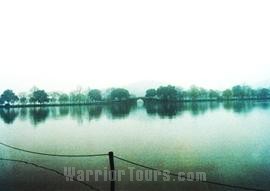Hangzhou Introduction
 Hangzhou, long famed as 'Heaven on Earth', is typical of the celestially bewitching natural scenery of the region of South of the Yangtze River. As one of the old capital cities of the former dynasties in China, it has also created many unique brilliant cultural sights that the world marvels at. The Italian traveler Marco Polo once praised the city as 'the most beautiful and magnificent city across the world' after he saw it. Ever Since then, Hangzhou has won continuous admiration from home and abroad.
Hangzhou, long famed as 'Heaven on Earth', is typical of the celestially bewitching natural scenery of the region of South of the Yangtze River. As one of the old capital cities of the former dynasties in China, it has also created many unique brilliant cultural sights that the world marvels at. The Italian traveler Marco Polo once praised the city as 'the most beautiful and magnificent city across the world' after he saw it. Ever Since then, Hangzhou has won continuous admiration from home and abroad.
Hangzhou is the capital of Zhejiang Province and is situated to the south of the great Yangtze River Delta and to the west of the beautiful Hangzhou Bay. It also stands in the pivot of the amazing Qiantang River and the longest canal in the world - Grand Canal. This unique geographical position accounts for the area being named as 'A Land of Fish and Rice'. It covers an administrative area of about 16.6 thousand sq km (4.1 million acres), with more than 6 million residents here. The climate is mild and moist.
The enchanting West Lake, also called 'Xizi Lake' (Xizi is recognized as the most beautiful lady in the ancient China), boasts the surrounding mysterious cloud-shrouded hills and the picturesque river scenery. 'There are 36 west lakes in the world while the best is in Hangzhou', goes the chant of a former poet who had traveled here. The unparalleled beauty of the lake is beyond words - you must see for yourself. The magic of the lake is further enhanced by the surrounding pavilions, pagodas, temples, mausoleums. Lingyin Temple that has unceasing burning of incenses; the fantastic Feilai Peak, the protruding Solitary Hill, the drinkable Hupao Spring, the majestic and overlooking Six Harmonies Pagoda and the historical Mausoleum of General Yue Fei are always the well-trodden areas for visitors.
The enthralling wonders of Hangzhou also include Qiantang River Bore, the grandest and most exciting river tidal stretches you can experience in China. Thousand Islets Lake (Qian Dao Hu) in an amazing setting of a thousand islets, produces the well-known Chinese natural mineral water 'Nongfu Spring'. The Tiantai Mountain Scenic Area not far from the city is home to a Chinese Buddhist sect and also draws many pilgrims and sightseers.
Hangzhou is also reputed as 'The Home of Silk' and 'The Land of Tea'. The well-known green tea in China-Longjing (Dragon Well) Tea is the product of this region. The silk production in Hangzhou has had a long tradition and the soft and delicate products have become a golden world-renowned trademark of this city. From the National Silk Museum and National Tea Museum, it is possible to appreciate varieties of these products and learn deeper of these cultures.
The Grand Canal is also the oldest canal in the world. Its construction went through three historical periods. In 486 B.C., King Wu, Fu Chai had the canal excavated. Thereafter the Yangtze and Huai Rivers were connected during the reign of Emperor Yangdi (569 - 618) and during the Yuan Dynasty in the 13th Century; thus finally completing the Grand Canal.
The Grand Canal is also known as the second Gold Watercourse after the Yangtze River for its irrigation of agricultural and industrial areas along the canal. Furthermore, unsophisticated water towns, historical sites and the profound culture make the Grand Canal a distinctive cultural tourism area.
The Beijing-Hangzhou Grand Canal, also known as just the Grand Canal was a great water project in ancient China. It runs from Hangzhou in the south of Zhejiang Province, via Jiangsu, Shandong, Hebei and Tianjin and finally ends at Tongxian County in north Beijing. It also passes through five watercourses, the Hai, Yellow, Huai, Yangtze and Qiantang Rivers. At a length of 1,794 kilometers, the Grand Canal is the longest canal in the world. It is 21 times longer than the Panama Canal and 10 times longer than the Suez Canal.
Admission Fee: CNY 15
Bus Route: K4, 504
